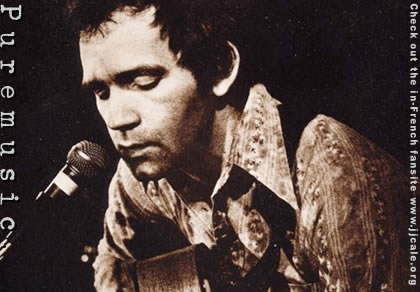
A Conversation with J.J. Cale (continued)
PM: So a lot of the covers of your songs are famous and well known. But I was surprised to read that something had been recorded by Beefheart, a favorite artist of mine. Do you remember what he cut?
JJC: I think he cut "Same Old Blues." I do not have a copy of it, and I don't think I've ever heard it. But I remember when he did it, because I don't think he's very active anymore.
PM: No, he's a painter now.
JJC: Right. But at one time he was very active in the music business, and they said, "Captain Beefheart cut one of your songs." I wrote a song called "Same Old Blues." Don Nix cut a song called "Same Old Blues," and probably a half a dozen other people have written a song called that. But Captain Beefheart recorded my version of that song. [I've since checked, and it's on the 1974 Bluejeans & Moonbeams album.]
PM: Wow, I can really see him doing a good job on that, because he did really have a blues aspect to him.
JJC: Yeah, he did. He was different than most. That was probably why he didn't get any more popular than he did. He was definitely unique.
PM: I mean, yeah, no white man ever sounded that much like Howling Wolf besides him.
JJC: Yeah, really, really.
[laughter]
PM: I can't think of anybody who's had a greater impact in such a quiet way on rock 'n' roll than you've had. I mean, that's just such an amazing thing in such a loud and bombastic thing as rock 'n' roll. You kind of went in there, and without trying to, kind of changed it, and changed it forever without making a big stink about it. How do you feel about what you could call that part of your reputation?
JJC: Well, yeah, I don't look at it quite that way. Eric Clapton, of course, cut a bunch of my songs. He's the reason I don't have to work for a living anymore.
PM: God bless him.
JJC: Thanks to Eric cutting my songs, it's kept me from having to get a job as a taxi driver.
PM: That's a beautiful thing.
JJC: But a lot of the English guys--Mark Knopfler didn't cut any of my songs, but I think he listened to a couple of my early albums and he got that groove. What I do is not what I really call rock 'n' roll. Dire Straits, that was some kind of European thing, and I guess I had a little of that influence on him--very little. I think he listened to Bob Dylan a lot for vocal stuff. But I truly--I don't think I had anything to do with--I think what I did was, a lot of musicians listened to my records and used some of that kind of a sound I get that I try not to get--
[laughter]
JJC: --because I've overused it. But I know what you're saying. I'm probably more of an influence on European musicians than I am on American. Now, of course, Lynyrd Skynyrd made "Call Me the Breeze" popular--but when you say rock 'n' roll, I don't consider anybody after that first generation of rock 'n' roll. The Beatles did rock 'n' roll, but basically all their big hits weren't rock 'n' roll, they were just European kind of music. It was melodic. Rock 'n' roll is not melodic. And all the Beatles' hits, "Yesterday" and all those songs, man, were all melodic.
PM: Right. That's pop music.
JJC: Right. Dire Straits were melodic. Now, my guitar playing gets melodic, but my singing never does. And that's probably what they heard.
PM: It seems that in your well-deservedly lucky career, you got all the best stuff, the success without the grind and the glitz that you really wanted no part of.
JJC: Yeah. I started doing that early on. I had played guitar for famous people in the early part of my life. And being famous, it's great for your ego--I mean, hey, "Everybody loves me!" But I noticed if you got real big, man, you don't have a real life. It affects the way you look at life. So when I started making records that went outside my hometown, and went, "Whoa, they know who I am in Paris, France," that kind of thing, I kind of laid back on the publicity. And they've called me a recluse because of that. I'm not a recluse, or whatever.
PM: Yeah.
JJC: But I kind of laid back on the machinery that elevates you into the super big time, for the simple reason that I went, "Well, if I live long enough, I'd like to play music and have enough people to listen to it when I want to do that, or I'd love to make records and have enough people to buy the records to where it pays for making the record and putting it out without having all the"--so early on I had that kind of thing. I've backed it off a couple times when I thought it was getting out of hand. "Well, do you want to be on The Jay Leno Show?" And I'd say, "Not really."
PM: [laughs] "Not really."
JJC: You know what I'm saying? That way I can have my music, it doesn't get real big, but I still make a profit, and I don't have to jump through hoops, man, and be something I'm really not.
PM: That's beautiful. continue
print (pdf) listen to clips puremusic home